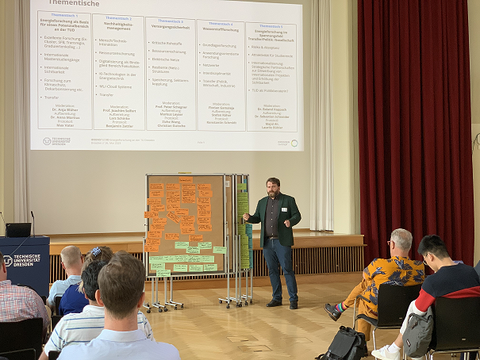Jun 13, 2023
Participation in the Energy Research Idea Studio
On May 26, 2023 the Ideas Studio Energy Research took place. The Vice-Rector for Research, Prof. Dr. Rösen-Wolff and Prof. Dr. Antonio Hurtado initiated and organized the format aimed at bringing together scientists in the field of energy from the various faculties at the TU Dresden and discussing whether energy research can be created as an additional profile line at TU Dresden.
The event was organized with the help of 5 moderated topic tables, to which the almost 40 participants could assign themselves:
- Energy research as the basis for an area of potential at TUD
- Sustainability management
- Security of supply
- Hydrogen research
- Energy research in the field of tension between transfer/politics/society
Dr. Maximilian Happach from the Chair of Energy Economics moderated the topic table "05. Energy research in the field of tension between transfer/politics/society". One result at this table was that energy research (and teaching) at TU Dresden is addressed very comprehensively and with scientific depth and enjoys a high level of attractiveness among students of the various disciplines. However, this offer is often not immediately obvious to students and employees. From this, the improvement of visibility was derived as a recommendation. Among other things, a stronger topic orientation on the TU Dresden website and the creation of a platform for energy research and teaching could contribute to this.
It emerged that stronger networking among the disciplines is desirable. The consensus among the participants was that technology research alone is not sufficient to meet the challenges in the energy sector. Rather, energy research is also needed in the context of cultural and social change, and this is where stronger networking and communication in energy research should come into play. Networking is to be seen on different levels: within the TU Dresden, with national partners in research, industry and ministries, and with international research partners.
The discussion also highlighted the limits of collaboration. Here, the focus was on the structure of research funding. Funding opportunities are mostly federal state, state or EU specific and a freer approach is desirable. Furthermore, the discussion participants were in favor of the TU Dresden taking an active role in political consulting.

